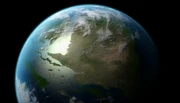Earth is home to all known life in the universe, from Carcharodontosaurus, to Elephants, the planet Earth is known for

so much devestation, and creation. The K-T Meteorite devastated the planet 65 Million Years ago, and before that, continents and climate change were also a devestation. Nevertheless Earth is home to the most wonderfull facts, and secrets.
Timeline[]
Originally when Earth was created, the first life true came to the sea, small Ammonites roamed the vast aquarium. Even though Micro-organisms existed before sea life, these are not visible to the naked eye, and are not always known to be the first life. Soon later life came to land, and soon after that, the first big predators evolved, such as Dimetrodon. After all this, a debated disaster struck, and came along the most succesfull species ever, the Dinosaurs. From top, to bottom, Dinosaurs soon dominated the landscape, evolving in their own unique ways as the continent of Pangea shifted apart. Diffrent factions of Dinosaurs evolved, winged and feathered Dinosaurs such as Microraptor and the heavy armoured group working Stegosaurus. Then soon in the late Cretaceous even the mighty Dinosaurs could not stop the Meteorite impact that took place 65 Million Years Ago. Years after Mammals took their height, as creatures like the Smilodon evolved. Soon after the Ice Age, where Mammoths roamed. And just after, fully evolved Human beings, our own species, and for roughly 6000 years, we have existed. This shows how succesfull Dinosaurs were, Tyrannosaurus Rex, one of the most well known predators, only lived 2 Million Years, and that is a lot more than 6000.
Summary[]
Earth, the third planet from the sun, is unique in the Universe as it is currently the only planet known to support life. It has a single natural satellite, the Moon, and is the fifth largest planet in the Solar System.
Earth's distance from the Sun is thought to be one of the key reasons why it is home to widespread life. Our planet occupies what scientists sometimes call the goldilocks zone. Its distance from our star means it is neither too hot, nor too cold to support liquid water - thought to be a key ingredient for life. Astronomers are searching for rocky planets like ours in the Goldilocks zones of other stars.